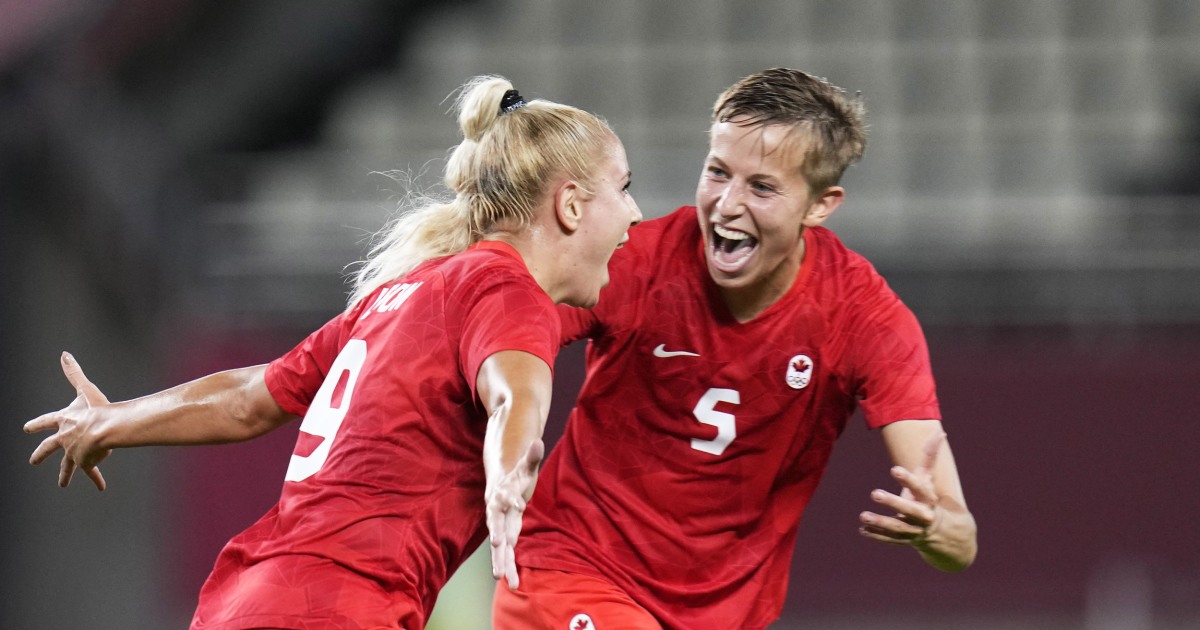
Canadian soccer star Quinn is one of at least three transgender and/or nonbinary athletes to compete in the Tokyo Games — along with New Zealand weightlifter Laurel Hubbard and the American skateboarder Alana Smith — but Quinn will be the only one to leave with a medal.
The color of the medal, however, will depend on Canada’s championship game against the Swedish women’s soccer team Friday.
Canada will compete for gold against Sweden after beating the top ranked United States 1-0 on Monday, thanks to a penalty kick in the 75th minute of the game.
Friday's game will be the first time a Canadian women's soccer team competes in a final match at the Olympics.
“I’m so proud of my team. They’re my best friends. I’m so glad we’re bringing back a better medal than bronze,” said midfielder Quinn, who goes by one name and uses gender-neutral pronouns, according to the Canadian news outlet CBC.
The Toronto native made their Olympic debut at the 2016 Rio de Janeiro Games, where they helped the team win a bronze medal. They previously played for Duke University, then played professionally for the Washington Spirit, Paris FC and the Seattle Reign FC, according to the Canadian Olympic Committee website.
Quinn came out as transgender and nonbinary in an Instagram post earlier this year and encouraged followers to be better allies to trans people by putting their pronouns in their Instagram bio, following trans people such as the author Janet Mock and practicing using gender-neutral pronouns with friends or in the mirror.
“Coming out is HARD ( and kinda bs),” they wrote in September. “I know for me it’s something I’ll be doing over again for the rest of my life. As I’ve lived as an openly trans person with the people I love most for many years, I did always wonder when I’d come out publicly.”
There are at least 180 out LGBTQ athletes at the Olympics this year, according to the latest count by the LGBTQ sports website Outsports.
Quinn and their team will win either a silver or a gold. Fans celebrated what their win means for trans and nonbinary people.
Quinn became the first openly trans athlete to compete in the Olympics' 125-year history, even though the Games started allowing trans athletes in 2004.
In an Instagram post July 22, Quinn wrote that they "didn't know how to feel" about the historic accomplishment.
"I feel proud seeing 'Quinn' up on the lineup and on my accreditation," they wrote. "I feel sad knowing there were Olympians before me unable to live their truth because of the world. I feel optimistic for change. Change in legislature. Changes in rules, structures, and mindsets."
They said they mostly feel "aware of the realities." For example, they wrote that trans girls have been banned from sports — nine states have passed laws that ban trans student-athletes from competing on teams that align with their gender identity.
Under current guidance, which the International Olympic Committee updated in 2015, trans men can compete in male categories at the Olympics without restriction.
Regulations regarding trans women athletes are stricter: Their testosterone levels must be below 10 nanomoles per liter of blood for at least 12 months before their first competition, though there’s no clear scientific evidence that proves testosterone increases athletic performance for elite athletes.
IOC President Thomas Bach said during a news conference in July while talking about Hubbard's participation that the rules governing trans athletes will be reviewed in the near future.
“The fight isn’t close to over," Quinn wrote in their Instagram post in July, "and I’ll celebrate when we’re all here."
"first" - Google News
August 03, 2021 at 03:12AM
https://ift.tt/3ilvr7a
Canada’s Quinn poised to be first transgender Olympic medalist - NBC News
"first" - Google News
https://ift.tt/2QqCv4E
https://ift.tt/3bWWEYd
Bagikan Berita Ini














0 Response to "Canada’s Quinn poised to be first transgender Olympic medalist - NBC News"
Post a Comment